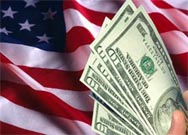Congress skeptical, but softening on rescuing auto industry
 Washington - US legislators have proven reluctant to provide the ailing car industry with the money it needs to survive, despite promises by executives to retool for the modern era and warnings of economic "disaster" if any of Detroit's Big Three declare bankruptcy.
Washington - US legislators have proven reluctant to provide the ailing car industry with the money it needs to survive, despite promises by executives to retool for the modern era and warnings of economic "disaster" if any of Detroit's Big Three declare bankruptcy.
It is a sign of just how deep a hole the carmakers find themselves in. Despite record job losses and a deepening economic recession, the government and lawmakers were not prepared to put taxpayer funds at risk for automakers that seemed doomed to fail regardless.
"I am concerned about the viability of the automobile companies," President George W Bush said Friday. "And likewise, I am concerned about taxpayer money being provided to those companies that may not survive."
The chief executives of General Motors Corp, Ford Motor Co and Chrysler LLC testified before Congress Thursday and Friday to ask for 34 billion dollars in federal aid, an increase on the 25 billion dollars they requested - and failed to get - just two weeks ago.
This time they came armed with extensive recovery plans that had been demanded by congressional leaders, promising to speed up the roll-out of more fuel-efficient vehicles and cut labour costs.
Both GM and Chrysler may declare bankruptcy - GM possibly by the end of this year - if they do not receive a federal bail-out. Some legislators suggested bankruptcy protection may be just what GM needs to go through the restructuring necessary to return to profitability.
The Big Three warned that some 3 million jobs could be lost if one of them failed, which could prove disastrous for an economy already in a protracted recession and shedding millions of jobs.
New government figures released Friday showed 533,000 jobs were cut in November, the sharpest monthly drop in 34 years, bringing the total loss this year to 1.91 million. Car sales have fallen to 25- year lows in the past two months.
But while many congressmen were sympathetic to the economic fallout, the carmakers' executives were collectively slammed for their failure to keep up with foreign competitors and adapt to a greener, fuel-efficient automotive market.
That leaves Congress with a dilemma: how to avoid an even greater economic disaster without awarding outdated policies and failed firms. It is a quandary that has kept Congress in a stalemate since November and may torpedo any solution at all.
"It would be nice if we could line up all the people who made the mistakes and punish them in a way that would have no impact on the innocent," said Barney Frank, the Democratic chairman of the House Financial Services Committee.
"But the focal point is not to punish those who made the mistakes. It is to prevent further damage to the country," Frank said, warning of an economic "disaster" if GM or Chrysler is allowed to fail.
Yet the reluctance may also be a sign that the US automotive industry is not as critical to the US' economic survival as executives would have the country believe.
The industry contributes about 4 per cent to US economic output. Treasury spokesman Philip Swagel said a bankruptcy would have "mainly a regional effect" on the so-called rust-belt states surrounding Michigan, though he acknowledged the impact would be felt to a more limited degree nationwide.
Members of Congress are planning talks through the weekend to hammer out a deal. Bush urged them to agree on a bill by next week.
Most politicians and economists agree something should be done to keep the auto industry alive. But the congressional hearings led to a steady stream of proposals and counterproposals on exactly what a federal bail-out should look like.
The Bush administration prefers restructuring an existing 25- billion-dollar fund that was approved by Congress last year for greener cars. Carmakers warn that may not be enough. Democrats argue the money should come out of the 700-billion-dollar financial rescue package passed in October.
Aside from where the money should come from, there have been a litany of proposals on how to keep watch over the taxpayer funds.
They include: creating a government oversight board that would be involved in the day-to-day operations of the companies; a condition that GM and Chrysler merge their operations; and a slowly rolled out bail-out with strict benchmarks to gain access to more funds.
Still others prefer no bail-out at all, including the top Republican on the Senate Banking Committee, Richard Shelby. He noted 34 billion dollars was likely only "the beginning" of the carmakers' requests.
Mark Zandy, an economist with Moody's economy. com who also testified, agreed. He forecast the Big Three would need anywhere from 75-125 billion dollars to stay afloat.
But Zandy suggested keeping GM and Chrysler alive for another six months may still be better than letting them fail amid the current economic recession. (dpa)